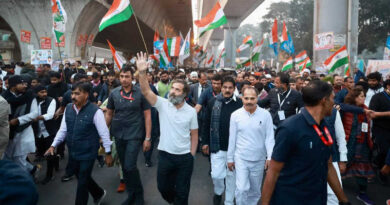Focus Must Be on the Quality of Democracy: David Campbell

Today, most democratic nations of the world are facing myriad socio-economic challenges and finding it difficult to keep the basic principles of democracy intact.
A leading global think-tank Democracy Ranking Association, however, believes that a democracy can perform effectively if the focus is on the quality of democracy.
To understand the finer nuances of a democratic system with focus on India – which is said to be the largest democratic country in the world – Raman Media Network (RMN) invited David F. J. Campbell, Academic Director of Democracy Ranking Association, for an interaction.
David presents his views in an exclusive interview with Rakesh Raman, the managing editor of RMN.
1. How do you define democracy?
There exist of course very different definitions of democracy. There are lines of division and partitions within theory of democracy that separate here opposite understandings. One major distinction is, how focused or how broadly should democracy be defined? Does democracy refer only to the political system, or does democracy furthermore include the context of the political system, meaning society, economy, also the ecology, by this addressing politics and society?
Over time, two tendencies can be observed: theories of democracies are becoming more complex; and narrow theories of democracies are being complemented by broader democracy theories.
In recent years, the concept of “quality of democracy” has gained crucially in importance. Quality of democracy allows distinguishing between different democracies, emphasizes that democracy is in constant flux and in development, where quality of democracy may improve, but also deteriorate.
Therefore, there is this constant need for democracy reform, in the established democracies as well as in the democracies of the emerging markets and newly industrialized countries.
Also, every approach to quality-of-democracy must be based on a specific theory of democracy and underlying model. Influential for the quality-of-democracy discourse was the work of Guillermo O’Donnell. O’Donnell defines quality of democracy as the interplay of “human rights” and “human development”.
Concerning development, he refers directly to the Human Development Index, which the United Nations Development Program publishes annually in its Human Development Reports.
2. Is democracy still relevant, as most of the traditional democratic countries such as America and India are facing numerous socio-economic hardships while a non-democratic nation China has emerged as the economic superpower?
In the contemporary world, do we experience a race between democracies and authoritarian regimes, which systems are actually more successful in economic development? There is also this notion of “developing democracies” versus “emerging autocracies” (the title of a joint article of Carayannis and Campbell for the open access “Journal of Innovation and Entrepreneurship”).
Russia and China are frequently cited as examples of being not really democratic, but economically prosperous. In the meantime, the growth rates in Russia and China also have come down, and currently the United States acts as a growth engine for the world economy (together with China).
There is the notion that advanced economies also require the formation of a knowledge economy. However, how should a knowledge economy be possible without also developing a democracy? Without further democratization, Russia and China run the essential risk of becoming trapped in their current level of economic development, which blocks further progress.
Therefore, I am skeptical that authoritarian regimes can prevail in the long run. But of course, the future is always open, and predictions may be wrong.
3. Democracy Ranking Association has placed India at a very poor, lower rank. What is lacking in the Indian democratic system?
To begin with, I think it is important to address and emphasize the achievements of democracy in India so far. Over the last years and decades, India continued its democratic legacy, while several of the neighboring countries followed a more authoritarian track of development.
Democracy in India progressed, acknowledging that India represents a multi-ethnic, multi-lingual and multi-religious society, with its richness of culture and art.
Democracy was perhaps the cohesiveness that held this pluralism together quite successfully. In my opinion, these are facts and circumstances which must be made explicit again and again.
In the Democracy Ranking of 2014, India scores at the ranking position of 70, out of a sample of 112 countries (for the years 2012-2013). By this, quality of democracy in India ranks lower than in most of South America, but ranks highest in South Asia.
When compared with Indonesia and the Philippines, India scores good on the political and economic dimension, but expresses weaknesses with regard to gender equality, health and knowledge (education). Judged on the basis of these data, there appears to be a particular challenge for India and democracy in India, how to transform economic performance into a general betterment of society.
The good news for India is that in the recent years, India has achieved relative progress in the political dimension and all the non-political dimensions. So the general tendency of development is positive, but India faces demands for further improvement.
4. Can quality of democracy be measured empirically? If yes, how can we do that for, say, a country like India?
Of course, the one major challenge for every model of democracy measurement is to avoid, as much as possible, an ideological bias to the left or to the right. Democracy measurement also must be different from measuring socialism, liberalism, conservatism or capitalism, because democracy is a trans-ideological concept, referring to political pluralism and the longer perspective and vision of human rights, their universal relevance and validity, and human development.
The Democracy Ranking Association applies the following conceptual definition for democracy: Quality of Democracy = (freedom and other characteristics of the political system) and (performance of the non-political dimensions).
The Democracy Ranking model refers to one political dimension and five non-political dimensions, which are: (1) gender; (2) economy (economic system); (3) knowledge (knowledge-based information society, research and education); (4) health (health status and health system); (5) environment (environmental sustainability).
To every dimension different indicators are assigned, therefore the dimensions behave as indicator-based. Indicators are taken from renowned international sources, such as the World Bank or Freedom House.
For final aggregation, the following weights are being assigned to the individual dimensions: politics 50%; gender 10%; economy 10%; knowledge 10%; health 10%; and the environment 10%.
The Democracy Ranking 2014 compared 112 countries, referring to development in the years 2009-2010 and 2012-2013. India was also in the country sample for the Democracy Ranking 2014, and scores for India reflect the general underlying model of measurement.
5. Can you suggest an alternative political system for India, because the current system has failed to bridge the rich-poor divide during past over 60 years and India continues to be poor country on all conceivable benchmarks, such as infrastructure, industry, health care, education, and so on?
Democracies were successful in addressing certain inequalities in the world. Gender inequality has decreased by tendency, even though the current situation in democracies is still far from perfect, the situation also varies greatly from country to country, and there is a clear need for further emphasis on gender equality.
However, in some democracies there is a positive record of improvements. Concerning income equality, the situation appears to be quite contrary. For instance in the developed and industrialized OECD countries, income inequality has not only decreased, but in fact increased in recent years, perhaps also the last decades.
Thus income inequality marks a problem for advanced economies as well as for newly industrializing and developing countries. In that sense, advanced democracies and India face comparable challenges.
So why were democracies not more successful in handling income inequality? Did democracies in fact fail with regard to reducing income inequality in the world? In times, where economic growth rates are falling, income inequality grows into an even bigger problem.
To a certain extent it represents a puzzle, why democracies did not manage to address income inequality more effectively. There may be several implications. There is a need for global governance regimes that fight tax evasion. At the same time, domestically, it could be argued in court that the existing tax regimes violate equality, because they grant to the rich and big corporations too many tax privileges, when compared to the average tax situation of the middle classes or lower income strata. For example, corporations should pay taxes there, where they make their revenues. This is the case for employees already.
6. What is the role of Democracy Ranking Association? Do you work to help governments implement democratic systems effectively?
The Democracy Ranking is being carried by the motivation to contribute to the development of democracy and quality of democracy, by providing systematic and comparative information, based on a broader theoretical model of democracy.
All information and data can be accessed for free at the website of the Democracy Ranking. The Ranking’s resources are exactly those ideas on quality of democracy and that democracy is crucial for further progress and innovation in the world.
The Democracy Ranking compares the progress of democracy in the world, comparing several years, also producing regularly a Democracy Improvement Ranking. From the beginning, the Democracy Ranking did not want to narrow the perception of democracy to the established democracies in OECD context, but was interested to address democracy in the whole global context.
The Democracy Ranking has the capacity and capability to cooperate with governments and international organizations, concerning democracy improvement. So far, the focus of the Democracy Ranking Association was on processing and communicating the annual rankings.
7. What should a common citizen expect from a democratic government to fully leverage the benefits of democracy?
In contemporary debate, there are three essential dimensions for quality of democracy: freedom, equality and sustainable development. Without freedom, there cannot be a democracy. The modern world requires innovations for further developing freedom.
Equality is the one new frontier, which pressures democracies, particularly when acknowledging concerns about income inequality. Sustainable development qualifies as a crucial benchmark for good governance. Sustainable development can take different forms and manifestations, expressing sensitivity for education and the environment.
The one big project is how to bring knowledge democracy, knowledge society and knowledge economy together. Knowledge and democracy matter, and knowledge democracy is not a privilege of the advanced economies, but is valid for all democracies in the whole world.
Finally, we also should not forget that the one strength of democracy focuses on preventing political authoritarianism, and this is also a value and achievement of itself. Therefore, democracy correlates with peace.
David F. J. Campbell (pictured above) is the Academic Director of Democracy Ranking Association, which is based in Vienna, Austria. He studied political science at the University of Vienna, completing his studies with a doctoral degree in 1996.
In 2014, Campbell received a “Habilitation” (Doctor Habilitatus) from the University of Vienna with a Venia Docendi for Comparative Political Science.





